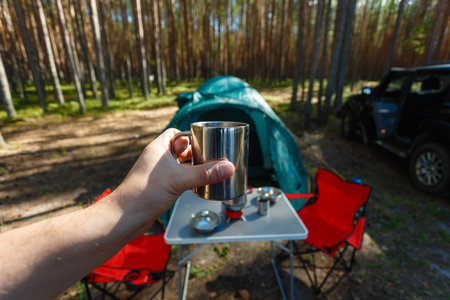1. Choosing the Right Containers & Bags
When it comes to packing for a camping adventure in the UK, staying organised starts with picking the right containers and bags. British weather is famously unpredictable, so it’s wise to choose waterproof bags or sturdy Tupperware to keep your food and utensils dry and clean, even if the heavens open unexpectedly. Eco-friendly totes are a brilliant choice too, as they’re kind to the environment and perfect for sorting snacks, ingredients, or kitchen kit. Consider how you’ll be travelling—if you’re hopping on a train or bus, lightweight and stackable options make carrying everything through stations and onto public transport much easier. For those loading up the car boot, containers that fit neatly together save space and reduce rattling on those winding country roads. With the right storage solutions, you can be sure your camping kitchen will stay tidy, safe from the rain, and ready for family meals wherever your UK adventure takes you.
2. Creating a Camping Kitchen Checklist
Building a reliable camping kitchen checklist is the first step towards a stress-free UK camping adventure. Before heading out, take time to sit down with your family and brainstorm all the essentials you might need, keeping in mind British favourites and unpredictable weather. A printable checklist not only ensures nothing gets left behind but also makes packing more fun and organised for everyone.
Why Customise Your Checklist?
No two families camp the same way, especially when it comes to food! Tailoring your list means you’ll have everything you need for that morning cuppa, afternoon biscuit break, or classic beans on toast after a long walk. Including British must-haves like a sturdy kettle for tea and a tin opener for those beloved baked beans will keep everyone happy and well-fed.
Sample UK Camping Kitchen Checklist
| Item | Purpose | Check |
|---|---|---|
| Kettle | For hot drinks (tea, coffee, hot chocolate) | ☐ |
| Tin Opener | Open tinned foods (beans, soup) | ☐ |
| Camping Stove & Gas | Cooking meals safely outdoors | ☐ |
| Pots & Pans | Preparing full English breakfasts or stews | ☐ |
| Mugs & Crockery | Serving drinks and meals | ☐ |
| Cutlery Set | Eating and meal prep tasks | ☐ |
| Washing Up Bowl & Sponge | Cleaning up after meals—no one likes sticky spoons! | ☐ |
| Tea Towels | Drying up in damp British weather | ☐ |
| Food Storage Containers/Bags | Keeping ingredients dry and safe from wildlife | ☐ |
| Bottle Opener/Corkscrew | Enjoying local cider or elderflower cordial by the fire | ☐ |
| Cool Box/Ice Packs | Storing milk, cheese, and treats safely on warmer days | ☐ |
Making It Printable for Family Use
Create your checklist in a simple Word document or spreadsheet so you can print copies for every trip. Involve children by letting them tick off items as they’re packed—this not only keeps them engaged but also teaches valuable organisational skills in a reassuring, hands-on way. Keeping your list updated after each trip will help you remember what worked well or what was missing, making future adventures even smoother.
![]()
3. Organising Food & Supplies for All Weathers
When camping in the UK, being prepared for every twist of the weather is just as important as your meal plans themselves. Rain or shine (or both in one afternoon!), keeping your food fresh and spirits high calls for a few clever tricks.
Keeping Perishables Fresh and Dry
Pop your perishables like milk, cheese, and sausages into cool boxes with sturdy ice packs—these are a must-have for any British family’s camping trip. If you’re venturing out for more than a couple of days, freeze some meals ahead of time so they can slowly thaw and stay chilled for longer. Always place cool boxes out of direct sunlight, ideally under a tree or inside your tents porch to prolong their chill.
Storing Tea & Biscuits: Quick Comforts at Hand
No matter where you set up camp, a proper cup of tea and a biscuit can make any grey day brighter. Stash your teabags, sugar, and favourite biscuits in airtight containers to keep moisture (and curious wildlife!) at bay. A small lidded tin or resealable bag works wonders for keeping everything crisp—even after a soggy walk back from the beach or woods.
Meal Plans That Weather the Storm
British drizzle is notorious for arriving unannounced, so it’s wise to have flexible meal options. Pack quick-cook pasta, instant porridge pots, or tinned soups that can be whipped up on your camp stove without fuss. Keep waterproof matches or a storm-proof lighter handy for those surprise showers—because nothing lifts morale like hot chocolate after getting caught in the rain!
Handy Packing Tip:
Layer your food supplies by mealtime (breakfast at the top, dinner at the bottom) in stackable crates or bags. This way, you can grab what you need without rummaging around in the damp.
Family-Friendly Bonus:
Let little ones help label containers or choose their own “rainy day” snacks. It makes them feel part of the adventure—and helps everyone find what they want quickly when hunger strikes!
4. Making Use of UK Campsite Facilities
When it comes to packing smart for your UK camping kitchen, knowing what facilities are available at most British campsites can save you time, space, and hassle. Many sites offer communal fridges, dedicated wash-up areas, and clearly marked recycling points—each with its own set of unwritten rules and etiquette. Understanding how to use these shared spaces not only helps you stay organised but also ensures a friendly atmosphere for all families enjoying the great outdoors.
Common Facilities at UK Campsites
| Facility | What’s Provided | Etiquette Tips |
|---|---|---|
| Communal Fridges | Shelves or baskets for food storage, sometimes labelled sections | Label your items with your family name and pitch number; avoid taking up more than your share of space. |
| Wash-Up Areas | Sinks with hot water, washing-up liquid (sometimes), draining racks | Clear away dishes promptly and wipe down surfaces after use so the next family can enjoy a tidy space. |
| Recycling Points | Bins for plastics, glass, cardboard, and general waste, often colour-coded | Sort your rubbish before disposing; rinse out containers to keep bins clean and odour-free. |
Sharing Spaces: A Little Kindness Goes a Long Way
Campsite kitchens are bustling places, especially during peak holiday times. Encourage children to help by carrying dishes or sorting recycling—these small actions foster responsibility and teamwork. Remember, a friendly “hello” or offer of help goes a long way in creating a supportive community feel.
Top Tip for Families:
Bring along reusable containers and bags for fridge storage and leftovers. Not only does this keep food fresh and protected from curious little hands, but it also shows consideration for other campers by keeping communal spaces neat.
5. Safe and Eco-friendly Packing
When it comes to organising your UK camping kitchen, packing with care for the environment is just as important as remembering the tea bags! Keeping things simple and safe helps protect our beautiful countryside and ensures a pleasant trip for everyone.
Minimise Waste with Simple Steps
Start by choosing reusable containers for your food instead of single-use plastics. Try to pack snacks and meals in boxes or tins you can take home and wash. Bring along a few cloth bags for bread, fruit, or loose items—these are not only practical but also cut down on plastic rubbish. Remember to bring a small bin bag just for your campsite rubbish, so you’re always ready to clean up after meals.
Pack Responsibly—Leave No Trace
‘Leave no trace’ is more than just a phrase; it’s a promise to respect the countryside. Always make sure all your waste goes home with you, especially food scraps that might harm local wildlife. Double check your spot before you leave, picking up even tiny wrappers or crumbs. If you see litter left by others, why not pick it up too? It’s a small act of kindness that teaches children about caring for nature.
Respect Local Wildlife
The British countryside is full of wonderful creatures. When packing up, avoid leaving behind anything that could attract animals—no one wants a curious fox rummaging through their leftovers! Keep all food packed away securely and never feed wild animals. Encourage little ones to watch wildlife from a distance rather than approach or disturb them.
Packing smart isn’t just about fitting everything in the car—it’s about making sure our adventures leave the outdoors as lovely as we found it. With a few mindful steps, your family’s camping kitchen can be organised, safe, and kind to the countryside we all cherish.
6. Fun Family Roles & Packing Routines
Getting ready for a camping adventure in the UK isn’t just about ticking off lists—it’s a fantastic opportunity to bring the whole family together and turn organisation into an enjoyable bonding experience. Involving your children in the packing process not only teaches them valuable life skills but also builds excitement and anticipation for your trip.
Assigning Everyone a Packing Job
Start by giving each family member a specific role based on their age and interests. Perhaps one child can be the ‘Snack Supervisor,’ responsible for counting out cereal bars and fruit pots, while another takes charge as the ‘Utensil Organiser,’ making sure all cutlery and plates are packed neatly. Grown-ups might handle anything sharp or heavy, such as camp stoves or kettles. This way, everyone feels included and proud of their contribution.
Turning Organisation Into a Pre-Camping Game
Make packing less of a chore by introducing playful elements. Create a checklist treasure hunt where kids must find and tick off items around the house, or set up timed challenges to see who can gather their kitchen gear the fastest (with a prize like choosing the first marshmallow at the campfire!). By gamifying these routines, you’ll transform preparation into part of the holiday fun.
Building a Sense of Adventure Together
Packing as a team helps children feel invested in the camping journey ahead. Share stories about why each item is important—perhaps that old thermos has kept tea warm during many misty Lake District mornings, or those enamel mugs survived last year’s windy Cornish coast trip. These shared moments not only foster responsibility but also spark curiosity about what new memories you’ll create together this time.
With every family member playing their part, packing your UK camping kitchen becomes more than just getting organised—it turns into the very start of your shared adventure, setting a positive and cooperative tone for all the experiences waiting just beyond your tent flap.


